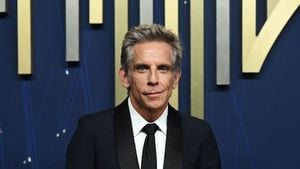Universal Music Group (UMG) has taken significant legal steps to dismiss Canadian rapper Drake’s defamation lawsuit, characterizing it as little more than the artist’s attempt to regain his footing after suffering defeat against Kendrick Lamar in their highly publicized rap battle. UMG filed its motion on Monday, March 17, 2025, asserting unequivocally, "Drake lost a rap battle he provoked and willingly participated in." The record label emphasized it would not accept claims of defamation stemming from the heated rivalry punctuated by intense diss tracks released throughout 2024.
Both Drake, known formally as Aubrey Drake Graham, and Kendrick Lamar are signed under UMG, though with different divisions. Their rivalry intensified considerably across 2024, culminating with the release of Lamar’s hit diss track “Not Like Us” on May 4, 2024. The song, which rapidly gained traction, went on to dominate the Billboard Global 200 chart and swept the 2025 Grammy Awards, winning both Song and Record of the Year.
The conflict began to escalate when Drake accused UMG back in November 2024, claiming they conspired to inflate streams for Lamar’s song “Not Like Us” on Spotify, hinting at possible involvement of payola techniques with iHeartRadio. Following this, settlement discussions between Drake and iHeartMedia took place last month, but his allegations against UMG remain active, prompting Drake to initiate legal action against the label earlier this year.
Drake’s suit, filed on January 15, 2025, paints UMG not merely as passive observers but as active perpetrators of what he deems "dangerous misinformation," alleging the company intentionally promoted false narratives targeting his character. This accusation includes claims of defamation due to the artwork featured on “Not Like Us,” which depicts Drake's residence with visual markers indicating local sex offenders' homes. This artwork, coupled with real-life tragic events—including the injury of his security guard during related violence—has underpinned his allegations of recklessness by UMG.
Responding to Drake’s lawsuit, UMG firmly stated, “The plaintiff’s complaint is utterly without merit and should be dismissed with prejudice.” The filing insists Drake is resorting to litigation to soothe the sting of his lost battle, rather than confronting it head-on. UMG asserted the hyperbolic nature of diss tracks, arguing such expressions are commonplace within the genre and should not be misconstrued as defamation.
“Not Like Us,” UMG contends, encapsulates the cultural essence of diss tracks, which often thrive on exaggerated insults. The record label went on to highlight Drake’s prior engagement with the genre’s norms—pointing to past statements where he criticized law enforcement's use of rap lyrics as literal evidence against artists, accusing him of hypocrisy. Since then, UMG has reiterated, “Drake was right then and is wrong now.” Their motion continues, warning of the chilling effect on artistic expression if the lawsuit proceeds, stating: "Diss tracks are celebrated art forms centered around outrageous insults, and they would be severely chilled if Drake’s suit were permitted to proceed.”
Drake’s lead attorney, Michael J. Gottlieb, countered UMG’s assertions, emphasizing the lawsuit’s broader implication concerning the music industry’s influence on artists. He claimed, “UMG wants to distract from the simple truth: A greedy company is finally being held responsible for profiting from dangerous misinformation.” He characterized the label’s motion as nothing short of desperate, contending it hides the accountability due to their perceived exploitation of the artist community over many years.
The legal tussle between Drake and UMG marks yet another chapter within the long history of feuds and insipid battles through the medium of rap music, where lyrics often serve dual purposes: artistic expression and innovative cultural commentary. The current feud, characterized by numerous audio exchanges, saw both parties releasing nine diss tracks aimed at each other, creating waves within the music community.
Despite the tension, both artists continue enjoying significant success; Lamar recently performed at the Super Bowl Halftime Show, receiving enthusiastic recognition from fans who joined him for his now-iconic performance of “Not Like Us.” Meanwhile, the crowd noise relating to Drake’s lesser-received tracks seems to add weight to UMG’s claim of his bitterness. The tension between them ignites heated debate among fans, raising questions about loyalty, artistry, and the boundaries artists should respect when engaging rivalries.
Drake's defamation lawsuit continues to be unresolved within the U.S. District Court for the Southern District of New York, as UMG vows to defend its position aggressively. The outcome of this case may not only influence the careers of those involved but set precedents for how record labels interact with artistic content moving forward, especially concerning contentious commentary within the genre of rap. With the courts soon set to decide on the merits of UMG's motion to dismiss, both Drake’s and Lamar’s next moves will be scrutizined as outward tensions affect their creative processes and public perceptions alike.






